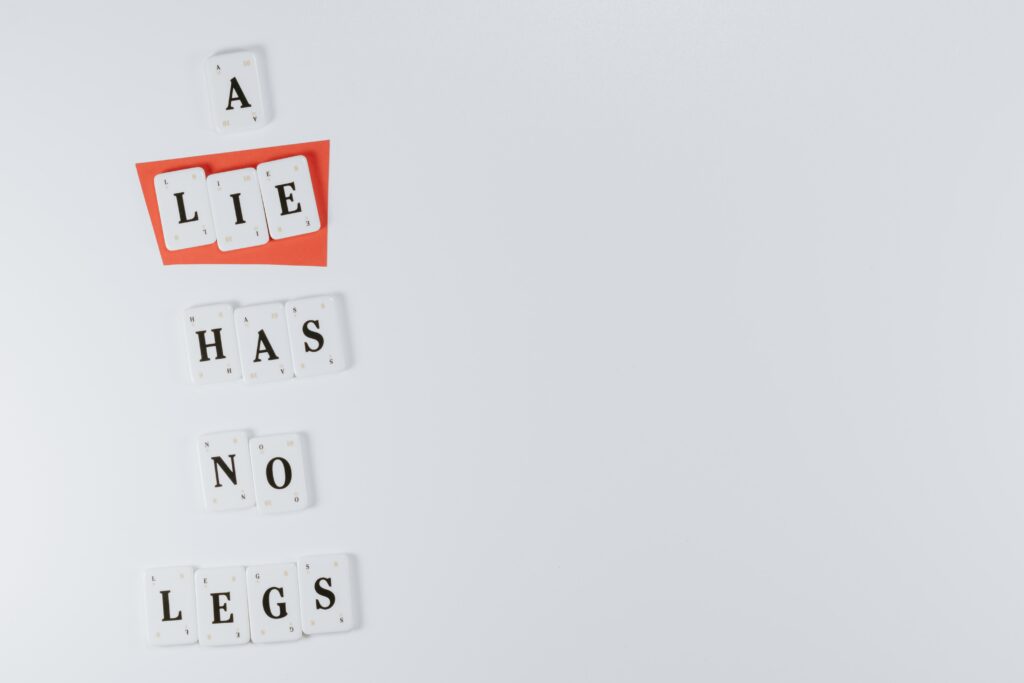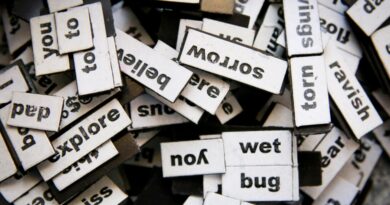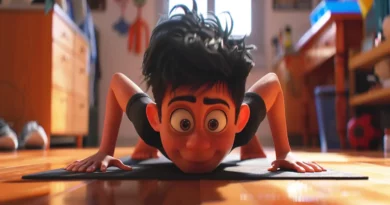Photo by Pawel Czerwinski on Unsplash
Neste vídeo do canal BBC Ideas, pesquisadores explicam como saber se alguém está mentindo ou dizendo a verdade. Não é tão simples como imaginamos identificar uma mentira. Eis por que devemos nossos ouvidos e não nossos olhos para identificar um mentiroso.
| Audio | |
|---|---|
Normal | Slow |
| English Transcript | Tradução |
| I'm Dr Chris Street. | Eu sou a Dra. Chris Street. |
| I'm a reader in cognitive psychology and the University of Huddersfield. | Sou professora de psicologia cognitiva e da Universidade de Huddersfield. |
| I've always had an interest in how people deceive others - for example, if I were lying to you right now, how would you know? | Eu sempre tive interesse na forma como as pessoas enganam os outros - por exemplo, se eu estivesse mentindo para você agora, como você saberia? |
| Would you look at my eyes? | Você olharia nos meus olhos? |
| At my body language? | Na minha linguagem corporal? |
| Would you look me up online? | Você me procuraria online? |
| I'm Chris Street, I'm a reader in psychology at the University of Huddersfield. | Sou Chris Street, sou professor de psicologia na Universidade de Huddersfield. |
| If we want to detect deception we need to stop looking for those visual behaviours that we think relate to deception, like eyecontact or fidgeting. | Se quisermos detectar a mentira, precisamos parar de procurar aqueles comportamentos visuais que julgarmos se relacionar com relacionados à mentira, como contato visual ou inquietação. |
| Instead we need to start thinking about the pieces of information we can find in the world that match or mismatch with the statement being offered. | Em vez disso, precisamos começar a pensar nas informações que podemos encontrar no mundo que combinam ou não com a declaração que está sendo oferecida. |
| If you want to be able to accurately detect somebody's lies or truths what you need to do is, you need to listen to what they're saying and the way that they say it, not how they're acting. | Se você quer ser capaz de detectar com precisão as mentiras ou verdades de alguém, o que você precisa fazer é ouvir o que eles estão dizendo e a maneira como eles dizem, não como eles estão agindo. |
| Think about when you are talking to somebody, you meet them for the first time, now any good poker player will tell you that it is very easy to control your face. | Pense em quando você está conversando com alguém, você o conhece pela primeira vez, agora qualquer bom jogador de pôquer lhe dirá que é muito fácil controlar seu rosto. |
| Therefore facial cues really aren't good cues of whether or not somebody is lying or telling the truth. | Portanto, pistas faciais realmente não são boas pistas para saber se alguém está mentindo ou dizendo a verdade. |
| What you should be doing is you should be listening to what people say - the verbal cues and the way in which they say it - the vocal cues. | O que você deve fazer é ouvir o que as pessoas dizem - as dicas verbais e a maneira como elas dizem - as dicas vocais. |
| A lie teller, because they are trying to think very hard, they will use probably the same word over and over again over a very short period of time. | Mentirosos, porque eles estão tentando pensar muito, provavelmente usarão a mesma palavra repetidamente em um período muito curto de tempo. |
| There's some general research that suggests we are about 54% accurate when it comes to detecting lies and truths and as I always say, "If that's the case, you might as well flip a coin - you'll be just as accurate." | Há algumas pesquisas gerais que sugerem que somos cerca de 54% precisos quando se trata de detectar mentiras e verdades e, como sempre digo: "Se for esse o caso, você pode jogar uma moeda - você será tão preciso quanto". |
| There are some people who think they are lie detection wizards. | Há algumas pessoas que pensam que são magos de detecção de mentiras. |
| That they can read subtle clues that we give off. | Que eles conseguem ler pistas sutis que damos. |
| The research suggests that this isn't the case, that there aren't lie detection experts. | A pesquisa sugere que esse não é o caso, que não há especialistas em detecção de mentiras. |
| Liars just don't give themselves away in any obvious fashion. | Mentirosos simplesmente não se entregam de maneira óbvia. |
| There aren't good clues to deception, we don't avoid eye contact, we don't scratch our face when we're lying or telling the truth. | Não há boas pistas para a mentira, não evitamos o contato visual, não coçamos o rosto quando estamos mentindo ou dizendo a verdade. |
| These just aren't reliable indicators and so, expert or not, we have no good information on which to make that decision. | Esses indicadores simplesmente não são confiáveis e, portanto, especialistas ou não, não temos boas informações para tomar essa decisão. |
| We have this idea that if somebody is lying to us they can't keep our eye contact. | Temos essa ideia de que, se alguém estiver mentindo para nós, não poderá manter nosso contato visual. |
| Now of course, liars know this and what they will do is they will keep your eye contact ever so slightly longer than normal, just enough to make you feel uncomfortable. | Agora, é claro, os mentirosos sabem disso e o que eles farão é manter seu contato visual um pouco mais longo do que o normal, apenas o suficiente para fazer você se sentir desconfortável. |
| Number two misconception tends to be when people lie they move about a lot, they kind of get very nervous. | O equívoco número dois tende a ser que quando as pessoas mentem, elas se movem muito, ficam muito nervosas. |
| In fact the opposite is true. | Na verdade, o oposto é verdadeiro. |
| When we lie, we have to think really hard. | Quando mentimos, temos que pensar muito. |
| So imagine you've got a limited amount of energy, you will channel all of that energy into telling a lie and as a consequence, you will become ever so slightly stiller than you normally are. | Então imagine que você tem uma quantidade limitada de energia, você canalizará toda essa energia para contar uma mentira e, como consequência, você ficará um pouco mais quieto do que normalmente é. |
| A third misconception is the idea that if we look up to the right or we look up to the left, it determines the type of lie or truth that we're telling. | Um terceiro equívoco é a ideia de que, se olharmos para a direita ou para a esquerda, isso determina o tipo de mentira ou verdade que estamos contando. |
| A recent piece of research has in fact debunked the idea that looking up that way or looking up that way is a good way to detect deception, it's not. | Uma pesquisa recente, de fato, desmascarou a ideia de que olhar para cima dessa maneira ou olhar para cima dessa maneira é uma boa maneira de detectar engano, não é. |
| My top tip for accurately determining whether somebody is lying or telling the truth is using something that we call the honest baseline. | Minha principal dica para determinar com precisão se alguém está mentindo ou dizendo a verdade é usar algo que chamamos de linha de base honesta. |
| Now the honest baseline is understanding how people act and speak when they're not stressed and when they're being truthful. | A linha de base honesta é entender como as pessoas agem e falam quando não estão estressadas e quando estão sendo sinceras. |
| So when we ask them a question, now if we find a pretty even match between the way they normally act and the way that they're acting now, we will be fairly happy that they're probably telling us a truth. | Então, quando fizermos uma pergunta a eles, se encontrarmos uma correspondência bastante equilibrada entre a maneira como eles normalmente agem e a maneira como eles estão agindo agora, ficaremos bastante felizes por eles provavelmente estarem nos dizendo a verdade. |
| If we find a mismatch, it might indicate that there is something going on here that we need to follow up with in a bit more detail. | Se encontrarmos uma incompatibilidade, isso pode indicar que algo está acontecendo aqui que precisamos acompanhar com um pouco mais de detalhes. |
| ALIED theory, or Adaptative Lie Detect Theory argues that when we try to decide if someone's lying or telling the truth what we're doing is actually quite functional and informed with our past experience and with the information available in the world. | Teoria ALIED ou Teoria Adaptativa de Detecção de Mentiras argumenta que quando tentamos decidir se alguém está mentindo ou dizendo a verdade, o que estamos fazendo é realmente bastante funcional e informado com nossa experiência passada e com as informações disponíveis no mundo. |
| For instance if I claim to have gone to France last week and I have a selfie of me in France that's a great piece of information that I was actually there. | Por exemplo, se eu afirmo ter ido à França na semana passada e tenho uma selfie minha na França, é uma ótima informação de que eu estava realmente lá. |
| But often we don't have that sort of information, so what do we do? | Mas muitas vezes não temos esse tipo de informação, então o que fazemos? |
| ALIED theory claims that we, rather than simply guess, rely on our past experience of the world to make an informed judgement. | A teoria ALIED afirma que nós, em vez de simplesmente adivinhar, confiamos em nossa experiência passada do mundo para fazer um julgamento informado. |
| People tend to be truth biased, they tend to believe people are telling the truth, and that may be something we want to get rid of. | As pessoas tendem a ser tendenciosas para com a verdade, tendem a acreditar que as pessoas estão dizendo a verdade, e isso pode ser algo de que queremos nos livrar. |
| The best thing to do is just try to keep an open mind and engage with the situation in a sceptical manner. | A melhor coisa a fazer é tentar manter a mente aberta e se envolver com a situação de maneira cética. |
| I'm Dr Chris Street. | Eu sou o Dr. Chris Street. |
| I. | EU. |
| Nope. | Não. |
| Do I have to say it exactly how you've done it or can I just say it as it comes out? | Eu tenho que dizer exatamente como você fez ou posso falar do jeito que sair? |
| I'm Dr Chris Street. | Eu sou o Dr. Chris Street. |
| I'm a reader in cognitive psychology at the University of Huddersfield. | Sou Professora de psicologia cognitiva na Universidade de Huddersfield. |
| I'm like, moving my hands here, you can't see. | Eu estou tipo, movendo minhas mãos aqui, você não pode ver. |
| Thanks for watching. | Obrigado por assistir. |
| Don't forget to subscribe and click the bell to receive notifications for new videos. | Não se esqueça de se inscrever e clicar no sininho para receber notificações de novos vídeos. |
| See you again soon! | Vejo você novamente em breve! |
Contagem de palavras
A tabela abaixo exibe as palavras encontradas neste vídeo, bem como o número de vezes em que aparecem.
Veja também: Para que serve esta tabela?
| Freq. | Palavra | Freq. | Palavra | Freq. | Palavra | Freq. | Palavra | Freq. | Palavra |
|---|---|---|---|---|---|---|---|---|---|
| 37 | to | 36 | the | 29 | we | 29 | that | 22 | you |
| 21 | a | 20 | is | 20 | are | 19 | they | 18 | and |
| 17 | of | 17 | I | 15 | not | 14 | or | 13 | in |
| 11 | it | 11 | do | 10 | if | 10 | have | 9 | when |
| 8 | will | 8 | truth | 8 | telling | 8 | lie | 8 | be |
| 8 | am | 7 | what | 7 | way | 7 | people | 7 | for |
| 6 | up | 6 | there | 6 | so | 6 | say | 6 | now |
| 6 | lying | 6 | just | 5 | with | 5 | think | 5 | need |
| 5 | information | 5 | how | 5 | good | 5 | as | 4 | very |
| 4 | street | 4 | somebody | 4 | our | 4 | my | 4 | look |
| 4 | detect | 4 | deception | 4 | cues | 4 | chris | 4 | at |
| 4 | about | 3 | would | 3 | world | 3 | want | 3 | university |
| 3 | this | 3 | theory | 3 | than | 3 | something | 3 | research |
| 3 | reader | 3 | psychology | 3 | over | 3 | on | 3 | make |
| 3 | looking | 3 | keep | 3 | idea | 3 | huddersfield | 3 | find |
| 3 | eye | 3 | dr | 3 | contact | 3 | can | 3 | an |
| 2 | your | 2 | which | 2 | whether | 2 | us | 2 | try |
| 2 | truths | 2 | time | 2 | them | 2 | tend | 2 | suggests |
| 2 | some | 2 | slightly | 2 | should | 2 | see | 2 | right |
| 2 | really | 2 | probably | 2 | piece | 2 | past | 2 | normally |
| 2 | mismatch | 2 | misconception | 2 | might | 2 | me | 2 | match |
| 2 | like | 2 | lies | 2 | liars | 2 | know | 2 | informed |
| 2 | honest | 2 | here | 2 | hard | 2 | give | 2 | get |
| 2 | france | 2 | fact | 2 | face | 2 | experience | 2 | ever |
| 2 | energy | 2 | doing | 2 | detection | 2 | comes | 2 | cognitive |
| 2 | clues | 2 | case | 2 | cannot | 2 | being | 2 | baseline |
| 2 | any | 2 | always | 2 | alied | 2 | again | 2 | actually |
| 2 | acting | 2 | act | 2 | accurately | 2 | accurate | 1 | word |
| 1 | wizards | 1 | who | 1 | were | 1 | well | 1 | week |
| 1 | watching | 1 | was | 1 | vocal | 1 | visual | 1 | videos |
| 1 | verbal | 1 | using | 1 | use | 1 | understanding | 1 | uncomfortable |
| 1 | type | 1 | two | 1 | trying | 1 | truthful | 1 | true |
| 1 | top | 1 | tip | 1 | those | 1 | third | 1 | thinking |
| 1 | thing | 1 | these | 1 | therefore | 1 | themselves | 1 | thanks |
| 1 | tends | 1 | teller | 1 | tell | 1 | talking | 1 | subtle |
| 1 | subscribe | 1 | stressed | 1 | stop | 1 | stiller | 1 | statement |
| 1 | start | 1 | speak | 1 | sort | 1 | soon | 1 | someone's |
| 1 | somebody's | 1 | situation | 1 | simply | 1 | short | 1 | selfie |
| 1 | scratch | 1 | sceptical | 1 | saying | 1 | same | 1 | rid |
| 1 | rely | 1 | reliable | 1 | relate | 1 | recent | 1 | receive |
| 1 | read | 1 | rather | 1 | quite | 1 | question | 1 | pretty |
| 1 | poker | 1 | player | 1 | pieces | 1 | period | 1 | out |
| 1 | others | 1 | opposite | 1 | open | 1 | online | 1 | often |
| 1 | offered | 1 | off | 1 | obvious | 1 | number | 1 | notifications |
| 1 | normal | 1 | nope | 1 | no | 1 | new | 1 | nervous |
| 1 | moving | 1 | move | 1 | more | 1 | mind | 1 | meet |
| 1 | may | 1 | manner | 1 | lot | 1 | longer | 1 | listening |
| 1 | listen | 1 | limited | 1 | left | 1 | last | 1 | language |
| 1 | kind | 1 | judgement | 1 | into | 1 | interest | 1 | instead |
| 1 | instance | 1 | indicators | 1 | indicate | 1 | imagine | 1 | has |
| 1 | happy | 1 | hands | 1 | had | 1 | guess | 1 | great |
| 1 | got | 1 | gone | 1 | going | 1 | general | 1 | functional |
| 1 | forget | 1 | follow | 1 | flip | 1 | first | 1 | fidgeting |
| 1 | feel | 1 | fashion | 1 | fairly | 1 | facial | 1 | eyes |
| 1 | eyecontact | 1 | experts | 1 | expert | 1 | example | 1 | exactly |
| 1 | even | 1 | enough | 1 | engage | 1 | easy | 1 | done |
| 1 | determining | 1 | determines | 1 | detecting | 1 | detail | 1 | decision |
| 1 | decide | 1 | deceive | 1 | debunked | 1 | course | 1 | control |
| 1 | consequence | 1 | coin | 1 | click | 1 | claims | 1 | claim |
| 1 | channel | 1 | call | 1 | but | 1 | body | 1 | bit |
| 1 | biased | 1 | between | 1 | best | 1 | bell | 1 | believe |
| 1 | behaviours | 1 | become | 1 | because | 1 | away | 1 | avoid |
| 1 | available | 1 | ask | 1 | argues | 1 | amount | 1 | all |
| 1 | adaptative | 1 | able |










Excelente!